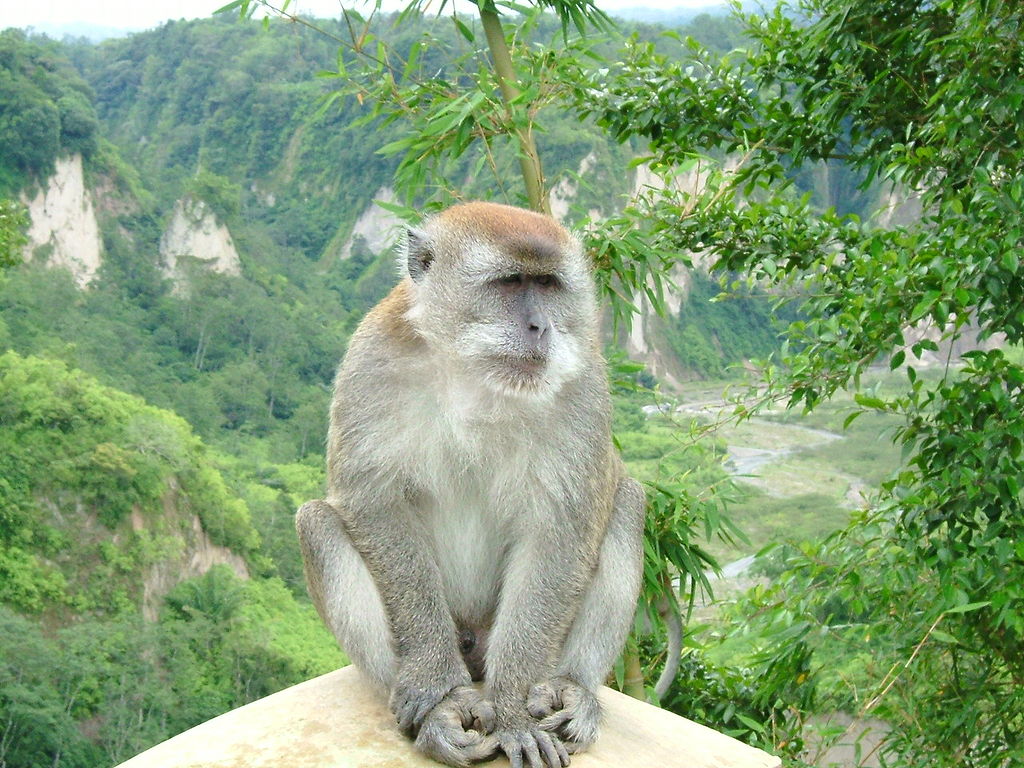.

Every day there are moments that do not seem to lead directly into the next moment. It must be those isolated moments, laid end to end, in which Zeno's arrow tries to cross the sky.
Since Zeno's arrow exists only inside his paradox, it can never land, and since, in those isolated moments, we too begin to take on the immateriality of a logical demonstration, there is no use in further discussion of that arrow.
A silence falls over the room.
All this is happening in a dream, or perhaps as if in a dream.
This is not the loud logical silence of a glacier but the muffled baffling silence of a dream. In the dream there is a forest, and in the forest there are monkeys whose bodies give off light.

We'll never visit the forest.
It makes more sense at the moment to think of a white monkey slowly fading back over a period of many long years into and gradually being absorbed by the surface--linen, paper, copper, wood--on which it is painted.

Or, perhaps, to think of the final note in a piece of music. The ripples of sound ebb away and finally there is no hint of reverberation left anywhere, silence fills the room.
This is not the cold silence of a paradox but the warm silence of a terrarium kept continually alive and in motion as in a dream without the isolation of sleep. As this silence takes hold of us it appears we're meant to experience life on a dying planet by becoming aware of other life. But this will not be easy.
If a lion could talk, we would not understand him.

Whether or not the white monkey also has such dreams we shall never know.

Japanese Macaques (Macaca fuscata), Jigokudani hot spring, Nagano, Japan: photo by Yosemite, 2005
A pair of Japanese Macaques at Milwaukee Zoological Gardens: photo by Cburnett, 2006
Macaca fascicularis, Ngarai Sianok, Bukittinggi, West Sumatra: photo by Sakurai Midori, 23 November 2005
Lion cub with mother in the Serengeti (Tanzania): photo by David Dennis, 2007
Japanese Macaque sleeping: photo by Reggaeman, 2006



17 comments:
Once Zhuangzi dreamt he was a butterfly, a butterfly flitting and fluttering around, happy with himself and doing as he pleased. He didn't know he was Zhuangzi. Suddenly he woke up and there he was, solid and unmistakable Zhuangzi. But he didn't know if he was Zhuangzi who had dreamt he was a butterfly, or a butterfly dreaming he was Zhuangzi. Between Zhuangzi and a butterfly there must be some distinction! This is called the Transformation of Things. (2, tr. Burton Watson 1968:49)
This hints at many questions in the philosophy of mind, philosophy of language, and epistemology. The name of the passage has become a common Chinese idiom, and has spread into Western languages as well. It appears, inter alia, as an illustration in Jorge Luis Borges' famous essay "A New Refutation of Time", and may have inspired H. P. Lovecraft's 1918 short story "Polaris".
Very interesting thoughts here, Tom.
The Void has been a topic for the ages, and the smallest smalls are becoming more visible, but also making things more complicated.
That some thing can only become so complex before the seed of chaos begins to sprout is somewhat frightening to we who long for permanence in our lives.
The meaninglessness of it all is mirrored back to us, and beckons us to do what we can, for all of us hope we mean a lot to those whom we cannot help but to love.
Nice to meet you. I'm just out cruising the electric cosmos this morning, and was intrigued enough by your comments to make myself pass this way.
Brilliant, Tom..
We are the letters in a page;
in a loop, loop, loop, loop.
Mariana, Uncle, Lanny,
The monkeys and me deeply appreciate your company. If we could talk like a lion, we would be able to express this more directly.
The Void may well be a kind of snowy zoo, with these overhead loops dangling. Oops, did I mean to say words?
I too have dreamt of meanings, like Pound's farfalla in tempesta, a moth lost in the storm, bewildered, seeking nonexistent distinctions.
Whether or not the white monkey also has such dreams we shall never know.
Tom: did butterfly and man die simultaneously? Obliquely apropos, you know how one occasionally mentally fumbles for a word or someone's name? Two nights ago I had a lengthy dream which I spent searching for the word "commodities". My only other odd "language" memory is a moment, more than twenty years ago, when the names of everything visible to me vanished: it was briefly fascinating to exist among unlabelled forms. See you later, Tom
Tom,
Here's Zhuangzi having
The Butterfly Dream
though of course it may be that he is merely being dreamed by the butterfly. Here I think we are back in tail-through-the-ring country.
Are either or any of us lucky enough to be merely dreaming these merry-andrewish larkings-about-in- the-aether?
___
"A voice in the dark city calls dreaming white monkeys in paradise," writes a friend in the night, bringing the question:
where is this place?
These voices from the dark city...
Is the butterfly dreaming them?
So today is "the day of our destiny".
What's in a Word?
"Tonight 'God is Great' is louder than any other night... I am shivering... I don't know if God shivers or not...
"Where is this place that no one helps us? Where is the place that our voices are getting heard through the silence?"
_________
I was stricken as a child with rheumatic fever and consequently spent a period of enforced isolation in a small room looking out upon the airshaft between adjacent building blocks. During this period I invented a game to play with myself, in which the names of things could be made to swirl away, in an instant dissolution process somewhat like screen-minimizing. The "trigger" word for this game was the word "silhouette," which, if silently repeated enough times, lost its meaning; as, in rapid succession, did all other words, leaving one alone to look wordlessly out upon the airshaft.
___
Did your "commodities" dream by any chance include a scene like this
Chicago bot?
The "Corn pit" of the early 90s... speaking of dream bubbles... a bot in commodity speak being a board of trade, though bored of Toms might also fit...
Thinking of you this week, the word I keep getting is "moveables".
Love, T
_________________
And too...yet then again...
"it was briefly fascinating to exist among unlabelled forms."
From the wings emerged a dwarf in a Sorcerer's Apprentice hat, jabbing a Disney cartoon-gloved index finger toward the skies. Singing:
"The identity sign
held Wittgenstein
is a lie
"Wittgenstein
wanted identity
eliminated
from a genuine
sign
language
by allowing
a multiplicity
of signs to show
a multiplicity
of objects
"A different sign
for each different
object
"The planet Venus
can be thought of
in different ways
and that is why
it can have two
different 'names'
"But 'Hesperus'
and 'Phosphorus'
are not names
"Genuine names
name things
that can only be tagged
"The name
labels the object
but does not describe
it .."
...at which point occurred the fragmentation of the primate brain into bits of prelinguistic particulate matter, a mere dusty monkey-brain-dust.
An overwhelming thread, which has (only momentarily, I hope -- or maybe I should hope for it to be an ongoing state) whited out today's to-do list.
"…the word "silhouette," which, if silently repeated enough times, lost its meaning; as, in rapid succession, did all other words, leaving one alone to look wordlessly out upon the airshaft."
Haven't we all been exactly there?
I like the silhouette mention in this context as it brings up that belated story about the origin of drawing in the tracing of the lover's shadow..
now draw
reversed
is ward
which in the 'vennusian'
parslippery
touches both
sword and word
(the lover leaves for war)
war(d
word venns to-->
ward
yielding the couplet
ao
which sounds like
ow
that sound
we make when in pain
but it also forms
the core sound
of ch(ao)s
or choose (existentialism)
or chase (Diana's bath, etc)
"drawing"
as in drawing out the poison
or the meaning
aka the pharmakon..
There is it seems
quite a "key to reflection"
in words themselves
just like the moon
or moonkey
or ye knoom or
chnum
the ram god
whose spiral horns
are yet e'en now
evocative
drawing
we are the wardens
of our own dreams
and our dreams
are the wardens
of us.
I forgot CAUSE!
Remember Adam and Eve!
George,
Know what you mean. Of course the entire purpose of this blog is to avoid cleaning out the garage and sorting through the piles of accumulated old-people junk, all those chores that make the late stages of life so boring if one accomplishes them and so terrifying if one doesn't. Does blogging have another purpose?
Lanny,
As always your word silhouettes leave large shadows, fanning out, or shall we say Venning out, to put in shade many of our previous conceptions.
Venning in rhythm with you, I recalled the moon-key in Del Schwartz's epithet "moon picture", for movies --what else but pure dreamt hollywood is a picture of a person mooning the moon?
Was Eve then feeling chnummy and gettin jiggy with the REM-god when she caused paradise to be lost in a charming chaos of chasing and choosing? Dream wardens tracking down the keywords with butterfly nets made of RAM-sleep?
I love your Venn't poetics.
The elegant symmetry and simplicity of
Venn's Four-Ellipse Construction
probably describes the world outside a poet's mind; whereas contrarily the complicated internal-poetic word-silhouette effect of multiplying/intersecting associational polygons with increasing numbers of sides, ultimately representing hypercubes, which appears to be the product of the language-fault, may be better pictured by
AWF Edward's Six-Set Venn Diagram
Edwards developed his diagram while designing a stained glass window in memorial to Venn.
Lewis Carroll devised a five-set diagram, fumblingly reduced to poetic metaphor a few months ago here in
Problems of Thought
Intersecting ellipses... in pictures? One lacks a diagrammatic mind. Help is required. You are obviously advanced in these sciences, Lanny, but for neophyte dunces (like me) there is this useful classroom tool that allows any beginner to
Create Your Own Venn Diagram
In fact I have long wondered if the meanings our words have for us exist at all for others. Once we are gone, what's left of our idiot babblings and scribblings? Only these strange unearthly word outlines. With their oceanic private association penumbras, entirely departed. Nimbuses and limbos of the lost words. Not unlike the notes I write to myself to try to remember things I know I will soon forget, such as where I put that last note. Is all this silliness then not one great
Perishable Memo?
And by the by, for those to whom such things "matter" (?)...
It is interesting to consider that the word "silhouette" comes from the name of Etienne de Silhouette (1709-1767), the French finance minister in the days when the ribbons were still on the haycocks. Was he a shady figure? Did he speak of livres and francs and sous in oblique poetic figures and blurry metaphorical outlines?
Silhouette was as it happens given to reading--and perhaps, who knows, in those days people were a bit less public about it, writing--poetry. He impressively translated Pope, among others. Indeed his perceived Anglophilia was widely resented and for a long while retarded his career; the Prince de Conde considered it "criminal". The influence of Madame de Pompadour however led to his appointment as Controller General in 1757.
Sihouette was uniquely qualified for the position. He was it seems an exceptionally stingy fellow. It was said that in his first twenty-four hours in his new position he saved the Treasury seventy-two million francs. The severe economies of a practiced translator of closed couplets! "This is the more remarkable because many of his relations were amongst those whose salaries he cut down," commented his biographer Michaud. Cutting away the redundancies in the administrative system, he carved the financial outlines of the French commitment to the Seven Years' War. He imposed stringent "general subvention" taxes on extreme wealth, made the nobility melt down their gold- and silver-ware. The austerity measures offended the rich and the privileged, even Voltaire, who conceded that a bit of belt-tightening might be all very well in theory, but please, don't melt my plate.
Silhouette lasted only eight months in the job, and there were sighs of relief from the grand chateaux and religious houses when he left court late in 1759 and retired to reconstruct his estates on the Marne. In his spare time he did a good deal of silhouette cutting. Here are some of
Silhouette's Silhouettes
I am stunned! Yeeah!
Thanks Tom!!
:)
How I got to my crackpot scheme
was trying to combine Venn with the whole iconicity shnanigans, or motivated signs stuff, and then there's the gordian knot which has always sort of symbolized the creative short-circuit for me, and so
once you start reading the words as lines, a whole different world (with some coaxing) will begin to speak..
Thanks for responding TOm!!
Tom, this corresponds with so much that has been on my mind lately. Zeno's arrow is the perfect metaphor for this feeling--the distorting shapes of a dream so often dislodge the real from its usual privilege and authority. And thanks for the narrative of Etienne de Silhouette---plate melter.
My copy of Tom Stoppard's Jumpers is in store somewhere, so I can't look this up, but I distinctly remember a character describing Zeno's paradox as "Arrows never actually reach their targets, and St Sebastian died of fright."
Zeph,
As you will recall, Stoppard's professor of moral philosophy, George Moore, one of this dramatist's relentless eccentrics, in the course of giving a lecture to prove that moral absolutes exist, and demonstrating that purely rational arguments do not always make sense, cites Zeno's paradox (How can an arrow, motionless at each punctum temporis of its flight time, reach its target?) and states Zeno's conclusion as follows: "since an arrow shot toward a target had to cover half the distance, and then half the remainder, the result was... that though an arrow is always approaching its target, it never quite gets there, and Saint Sebastian died of fright."
In the play's tragicomic/farcical climax, of course, the philosopher, attempting to disprove Zeno's paradoxes, manages to crush his pet tortoise Thumper underfoot.
I would oppose the philosopher and take the thus-I-refute-Berkeley contradictory view that St. Sebastian died not of the fright but of the arrows. After all there were so many of them--at least in this "postconceptual" fifteenth century depiction by Giovanni Baleison (who by the way was a specialist in painting Saint S. and did so in churches all across southern Europe, so that one might almost say the poor saint was not only an arrow depository but a cash cow for Giovanni) :
St. Sebastian Has No Concept
Post a Comment